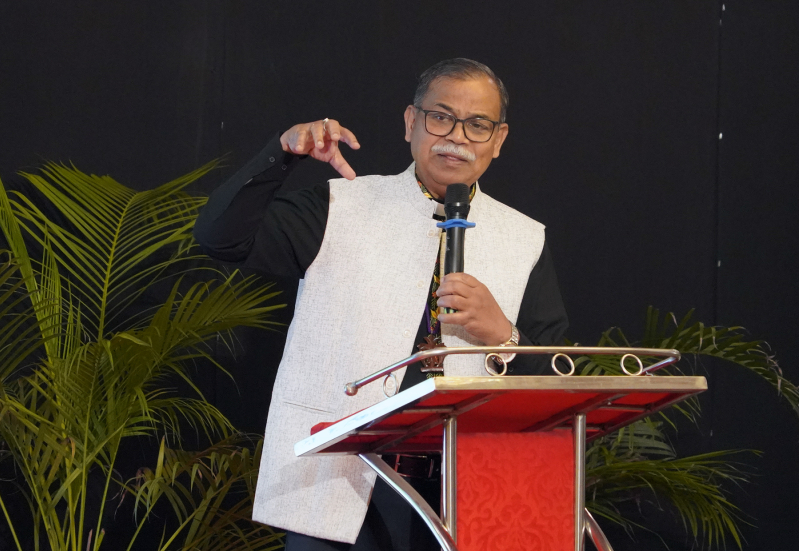
The second day of the All India Congress on Church in Mission (AICOCIM) opened with a plenary address from Bishop P.K. Samantaroy of the Church of North India, who offered an honest reflection on the Indian Church. Balancing “joy and sadness,” he celebrated the growth of Christian communities while lamenting what he called a “deficit of impact” in their witness.
“I stand before you with a heart filled with joy for all that God is doing in our country,” he said. “At the same time, I am also filled with sadness, because the very fact that we must gather to discuss these things proves that something is still lacking. The bride of Christ is not yet perfect.”
Samantaroy described his own background with humility, recalling his upbringing in a small village and his lifelong sense of dependence on God’s grace. His joy, he said, comes from seeing Christians across India engaged in mission, despite challenges. Yet his sadness arises from the sense that the Church has not had the transformative impact of the early Christian community.
“The church does not exist for itself,” he said. “We do not come to the church to remain in the church but to go out. That is the very basic purpose of being a Christian.”
Pointing to the Day of Pentecost, he reminded delegates that the first believers, empowered by the Holy Spirit, left the safety of the upper room to carry the gospel to the world. By contrast, he warned, Indian Christians sometimes remain separated from their neighbors of other faiths, clinging to a legacy of missionary influence that emphasized difference rather than shared humanity.
“Our God is their God,” he said. “We must relate to our brothers and sisters in this land as children of the same God.”
Reflecting on his years of ministry in Punjab, Samantaroy said that the Church in India often builds “houses without foundations.” Without deep discipleship, he cautioned, Christians can falter when difficulties arise.
The solution, he argued, is a return to basics — strong teaching from childhood, vibrant Sunday schools, and spiritual formation that equips believers to endure hardship. “Only then,” he said, “can the Church withstand the storms that come against it.”
Samantaroy emphasized that in today’s context, believers should witness through their daily lives. “The purpose of the church is to glorify God, to reconcile the world to God, people to people, and people to creation,” he said.
For him, this means living in love toward neighbors, even those outside the church. “When I became Bishop of Amritsar,” he recalled, “I told myself: I am not only the bishop of church members but of all the people in Amritsar. God has entrusted them to me, and I must love them.”
Sadhu Sundar Singh and William Carey as models for the Church today
To illustrate what authentic discipleship looks like, Samantaroy pointed to Indian and Western missionary figures whose lives were marked by self-denial and sacrifice.
He recalled the example of Sadhu Sundar Singh, who turned away from wealth and comfort to live as a barefoot evangelist. “He had two options,” Samantaroy said. “He could have chosen the wealth of his family, or he could choose the Bible. He chose the Bible, because he had found the true treasure.”
Singh’s willingness to endure poverty and suffering, he argued, left a model for today’s Church. “If you find a pearl, you sell everything else to make it your own,” Samantaroy said, quoting the gospel.
He also highlighted William Carey whose work in education, printing, and translation transformed India. Despite opposition from the East India Company, which barred him from working in Kolkata, Carey moved to Danish-controlled Serampore and established schools, translated the Bible into multiple languages, and began one of the earliest Indian newspapers.
“Carey’s life was dedicated not to himself but to uplifting the lives of Indian people,” Samantaroy said. “He used his gifts for the good of others, and in doing so left a legacy that continues to this day.”
Such examples, he argued, remind the Church that discipleship is not about comfort but about sacrifice, not about prestige but about faithfulness.
‘We must return to our first love’
Samantaroy warned that the Church in India is in danger of losing its “first love” for Christ. He lamented the spread of practices that commodify faith, such as the sale of blessed oil and water. “My heart pains when I see this,” he said. “We are still feeding people with milk, not with solid food.”
For Samantaroy, such practices show how easily the Church can substitute rituals or formulas for true faith. “The foundation of the Church, which is faith in Jesus Christ, has been compromised,” he said.
The heart of Samantaroy’s address came in his insistence that every Christian must embrace the call to evangelism. “The Church can only be a missionary church if every member of the church is an evangelist,” he said. “It cannot be a church if it is not a missionary church. One cannot be a member of the church if he is not an evangelist.”
He cautioned against the tendency to delegate evangelism to clergy, missionaries, or specialized workers. “We need to stop the business of delegation,” he said. “Every congregation, irrespective of denomination, must be a missionary church.”
This vision, he acknowledged, requires sacrifice and courage. But he insisted it is the only way the Church can be faithful to Christ’s command.
“Love knows no bounds,” he said. “When you love someone, you want to give and give and give. Today, the love of the church for Jesus Christ has grown cold. We must return to our first love.”






